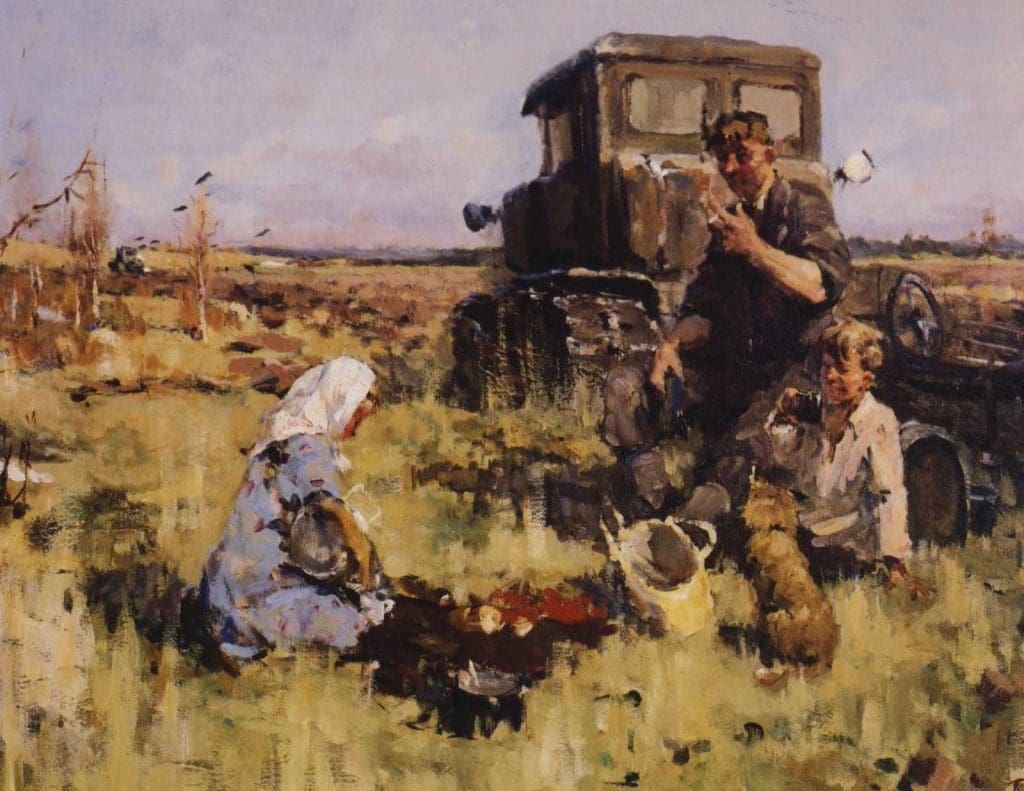AntiNote: the following is an unauthorized reproduction in English of a thirty-some-year-old exploration of post-industrial society’s incapacitating delusions about work, how they are suspiciously similar on the right and the left, and how we might rid ourselves of them. Amidst the current wave of “Work—WTF?!” thinkpieces, let’s remember that we’re not starting from scratch here. Not that life, history, and politics are entirely just a depressing treadmill, but: why re-invent the wheel? Seems like a lot of unnecessary work.
Abolishing Work
(A work of words)
by Ruedi Lüscher, for issue #3 of the socialist journal Widerspruch (Zurich)
June 1982
“A healthy civil society which provides the possibility of a life with dignity to every solid, hardworking citizen will not succumb to false sentimentality, and will make no concessions to it.”
—Ernst Nobs
“Democracy divides people into two categories: those who work and those who are lazy. Therefore, democracy is not meant for those who don’t have time to work.”
—Karl Kraus
Not everything strenuous is work. Also, some things considered work are fun. Housework doesn’t count as work, we are told, because it is a labor of love. Love, though, takes work too: relationships take work—beginning with working to win someone’s affection and ending with working through your loss of it. Sometimes work is physical labor; occasionally, though, one gets paid for simply talking—and, of course, it seems one can get paid handsomely for the work of others.
It’s arduous work, pondering all this. What is it, precisely, that we’re abolishing here?
*
These lines, for example, could be considered the product of work. A reader for whom part of their job is to read is working right now. Booksellers, letter carriers, shippers, printers, bookbinders, typesetters, and editors (even our editing collective) all do work. The writer…well.
*
I’m not getting any money for these lines; I play with them when and how I feel like; I can stop whenever I want and no one’s worse for the wear; and for some reason I have trouble convincing other people that writing these lines is a form of work.
*
On the other hand, writing tires me out; writing could, if I published someplace else, earn me money; and instead of writing I could be engaging in free time activities—going to the movies, hanging out with friends, cooking a curry. But isn’t chopping onions also work? Doesn’t making friends take work?
*
“Everyone deserves to work. Not just because business requires it, but for the sake of their character. Yes, work is stress and strain, but it is also satisfaction. And more: vitality, fresh air and sunshine, nutrition for the soul. Work also makes the body hungry, makes the body tired. Work gives us the desire for relaxation, the pleasure of recovering on the weekend, the happiness of Sundays and the exuberance of a proper holiday. Work is one of the world’s great delights, divine as spring fields in bloom and the blue mountains just beyond, on the edge of the horizon.” (Ernst Nobs, 1943)[i]
*
And then there’s the loafers. We should feel sorry for those indolent bastards! Think of all they’re missing out on because they don’t work! But Nobs’ reasoning goes in an altogether different direction: “I have always wished for a righteous storm to shake the parasites from the tree of life.”[ii] What’s with the rage, Mr. Nobs?
*
When’s the last time you heard anyone say, “You don’t work? You don’t know what you’re missing!” No, it has always been more like, “Would you rather forced labor, you foot-dragging shit?” This is among the worst threats commonly leveled at rebellious youths: imprisonment in a work camp. Of course, if work is so delightful, how could it be used as a threat?
*
Work, as every dictionary tells us, is toil, effort, drudgery. But “since human activity has gotten freer and more elaborate (less menial), it is natural to extend the usage of the term work to include easier and nobler tasks.”[iii]
*
Plato said work makes people brutal and stupid. His teacher, of course, was a jester who shirked out of shoe-repair and performed raving lectures at market about god and the world. Socrates’ work ethic was clearly underdeveloped. Ernst Nobs would surely have happily handed him the hemlock. Plato’s retort: purposeful, physical labor, handwork, and philistinism do not suit free men who wish to know the world.
*
The true value (and valuedness) of work will only rise when the bourgeoisie comes up with a new model for its recognition and conception. As it is now understood, work, physical labor, is the medium through which a subject (regarded as having agency) makes the world his own—and through this process of appropriation, we could call it, he acquires knowledge of the world and of himself, and becomes self-actualized.
*
Hm. It’s just that the bourgeoisie has decided to erect a dysfunctional mode of production that stymies this process of appropriation (finding other processes of appropriation much more important). This is alienation. Technology, division of labor, and the “disciplining” (double-meaning intended) of the workforce are among the dynamics within the dictates of capital appropriation that conspire to make the overall system of commodity production less transparent to a singular producer, our subject worker, no matter how bright a light is shined on it. Acquiring knowledge is not part of the program.
The industrial revolution had barely gotten rolling, and Hegel saw it already:
“Work and Necessity, elevated and conjoined in this grand universality, will begin to form in larger populations an enormous web of communality and mutual dependency, a system alive with death, blind and crude in its movements as it thrashes this way and that—a wild animal that requires strict controls and tight restraints.”[iv]
*
Traditionally, workers movements have attempted to tune the dissonance between dismal individual experience and sunny societal conceptions of work—by taking sides with the societal. But these efforts are unconvincing, and fail: there are simply no cheerful images of industrial work. Nobs and many others content themselves with platitudinous benedictions, in which work is evidently never done under industrial conditions. But more meticulous minds only go a little further—as far as the dead-end down one of two vaguely promising streets: either upping the ante on romanticizing work (extolling the jack-of-all-trades, the multidisciplinary, the polytechnic—another version of the “well-rounded,” “fully actualized” character) or deformalizing it (extolling the “dual economy” with an autonomous sector).
Proletarian solidarity was an attempt to raise the cohesion of communities to industrial-bureaucratic proportions. Eek.
*
In these utopias, golden-hued images of nice, anachronistic work mingle with snippets of the old dream of Schlaraffenland. If I understand correctly, under this rubric there are two desirable types of work: that of farmers and that of the proto-bourgeois artisan-intellectual. Oh, and a third: women’s housework. Somebody’s still got to do that.
*
Agricultural work, though breathlessly characterized as the noblest way of grasping the world and bending it to one’s will, is better understood as the eternally uncertain, anxiety-inducing intercourse with a living and famously moody Mother Nature. Still, it only makes it into the imagery of today’s proponents of work with much of its inherent riskiness and difficulty sanitized out. In their accounts, one does not see much more than Nobs’ version of the countryside: a postcard from your nature-loving touring club friends.
Nonetheless, the independence, as well as the independent rhythm, of agricultural work, its variability and versatility, and its orientation towards living rather than administrable objects, still feed our images of “good work.”
*
The artisan-intellectual of the Renaissance, the first and last true polytechnic, has lost some of his glamorous sheen ever since being blamed for the eventual mechanization of the West. But his carefree specter will not vanish so easily! The curious, hands-on experimenter—who wants to untangle the mysteries of the universe and discover the laws that govern it—writes, uses implements, reads, builds new implements, sells a few of them, freeloads off lordly patrons and seeks the company of other artisans, is in love with both knowledge and people, and unites in one person the virtues of innovative imagination and methodological rigor!
*
Housework done in exchange not for money but for love cannot seriously be called work, or else the entire economy would surely collapse into chaos, that’s a given. But in the images of the work of caring, teaching, cultivating, nurturing, and healing which industrial culture has painted for us so colorfully, there glows, once again, that age-old longing for a human activity that is interaction with the living and not the administration of things.
*
Let’s be honest. None of this really fits into the scheme of work currently on offer in industrial society. And at the same time, the industrial production complex is busy devaluing its own modes of work, which already appear, considered against the ideal, pretty damn cheap already. Seems bleak—but there’s always buying shit. Ever since the process of capital accumulation tied the (inherent!) virtue of growth to mass consumption, we have a new way of having a “good time” in our “free time”—indeed, the only times that count as good times, whether we’re talking personally or macroeconomically, are times devoted to consumption!
(The world of work does crop up in advertising from time to time. For example, when it is headache remedies that are being sold…or “strike anywhere” matches.)
Work, because it brings wages, opens the door to…the supermarket. Something of Nobs, that worker who likes lazy Sundays so much, shines through here.
*
Work can only be praised in the abstract; work is used to threaten people—what exactly does work have going for it in industrial societies? That the supermarket shelves would be empty if it stopped.
*
Contemporary praise of work can almost always be understood as coming from the mouth of a consumer. We (non-workers, in this sense) are pro-work because it provides us with stuff. And as we are reasonable people, we recognize that it’s work that somebody has to do—and whoever does do it will be compensated. With the chance to consume! The only thing good about this work, we admit, is what comes after it’s done. The product, and the payment.
*
Work and satisfaction are connected through wages. In highly complex industrial states, this connection can be experienced only abstractly—our economies have grown far beyond the quaint practice of simple exchange, our fantasies limping behind. The welfare state only exacerbates our incomprehension: just as work and wage are not balanced by some “market” but are negotiated politically, the ties between wage and satisfaction also get loosened by politics and culture, and the interwovenness of these three vectors (work, wage, and satisfaction) comes undone faster and faster.
The downgrading of work from its current perch as an unassailable virtue will be an essential condition on society’s continued stability and functioning.
It is precisely this big knot, coming undone faster and faster, that proponents of work would like us to see as a firm moral bond: they continue to claim that to earn a wage is in itself something satisfying. This ethic feeds on the memory of a legitimate “market”—insofar as there ever was such a thing—and cannot be assimilated within any serious cost-benefit calculation: strange for economic puritans to rely on such an intangible.
*
The world-historical defeat of the labor movement permeates this cheerless ethic. The movement set itself against the mediation of human activity by wages, preferring it to be mediated by solidarity (the result would be, one could assume, a tiny step away from some pre-industrial form of society…). Nonetheless it found itself stranded in the icy wasteland of wage-abstraction—and in these kinds of life-threatening conditions, people huddle in tight to share warmth. Proletarian solidarity is always stronger the closer proletarians sit to one another! Bind together!
Proletarian solidarity was an attempt to raise the cohesion of communities to industrial-bureaucratic proportions. Eek. The wages were too cold: the ice-blossom of solidarity is something called work ethic.
*
Although. Work ethic is also clouded by bourgeois heritage. Work ethic is, of course, the protestant work ethic, both heaven and capital accumulation be damned. Like all such ethics, it remains abstract: it is not based on some alleged desire to work, but rather on the rewards at workday’s end—and at life’s end. Just as the fastidious wealth-hoarding burgher could read divine providence and the promise of heaven into his “good fortune” in amassing a fortune, the moralized producer (with a much narrower range of expectations) is encouraged to read his wage as an earthly reward, providing, as it may, for earthly comforts.
This work ethic, trying as it does to find the good in work but looking outside the activity of industrial production itself, also finds no place in our imagery of “good work.” Drudgery and pleasure just aren’t separated that neatly by the sounding of the evening whistle.
*
The “economization” of work goes hand in hand with the commercialization of free-time: McDonalds and Sainsbury’s also rationalize their customers (this is something with which Nobs, understandably, did not reckon: the “free time” he was talking about was before the age of mass consumption and tertiarization). As such, the dual concepts of work and its opposite collapse into a unity: the door to the supermarket, sliding open, only offers a glimpse into another factory.
*
Wait a minute, what if abolishing work meant abolishing consumption? After all, rising unemployment leads to declines in consumption. The horror!
“The worst thing that there is, is unemployment,” declaimed social democrat Jean Ziegler over Zurich’s Münsterplatz on the First of May, 1981. Those attending the demonstration were divided in their reactions. Memories and fears of crisis tend to drown out experiences of work stress, humiliation, and routine. But if work does indeed begin to disappear from industrial economies (through automation or otherwise), or when the social costs of rapacious economic growth become unbearable (and neither is an altogether implausible scenario): at that point the downgrading of work from its current perch as an unassailable virtue will be an essential condition on society’s continued stability and functioning.
Up to this point, crises in work ethic and economic crises have, one would think, never occurred simultaneously. If the economy lurches, work becomes that much more valued. It seems plausible to assume that the two kinds of crises are beginning to sync up, though. The desirability of even “good” work is in decline.
*
Beginning to stir again is that tradition of the labor movement, solidarity, in disguise. It’s in disguise because it is still embarrassed at its failure to face down capitalistic pedagogy and competitive socialization as an equal opponent in the ideological fight that has consumed this century. At any rate, the longing for community that we call solidarity, both within and outside industrial-bureaucratic socialization, has a double life, so to speak. It is acted upon in two ways.
The next round of market rationalizations is surely on its way, and it will make the moralization of work in industrial society much more difficult.
Firstly, on the fringes of the production process, some producers detach themselves from the Gross Domestic Project and warm up to a “back-to-nature” ethos and the idea of symbolic, non-quantitative rewards, and latch onto agricultural and artisanal pursuits and traditions. They can do it, however barely and miserably, often because they are sustained by a social safety net of sorts: solidarity.
The second occurs rather in the center of working society: inconspicuous producers, using the monetary circulation, warehouses, and infrastructure at the companies they work for, inconspicuously divert resources and fudge the overhead reports. Every industrial operation supports, knowingly or unknowingly, a black economy.
In a sense, both the fringe-economy freaks and their counterparts the black-marketeers do work, work which is grounded on two things: the cultivation of knowledge and consciousness by resisting the industrial-bureaucratic apparatus, and the conspiratorial solidarity among black-marketeers and freaks, respectively.
*
As these are two different kinds of solidarity, however, they relate to work differently. The black-marketeer operates within the framework of economized work, and attempts simply to redirect its economization to his benefit. Perhaps he falls short of a production target—let’s call that work obstruction or sabotage, why not? Or he “alienates” company resources from their intended purpose—another way of describing working “under the table” (working “black”), or, you know, theft. But the conspiratorial solidarity of the black-marketeer within a company (or of the “black” worker without) does not challenge the fundamentals of working society.
If we want to look at it from a perspective of self-actualization, the “process of appropriation” the black-marketeer enjoys through his work simply takes a form resembling resistance against the company and its profit- and production targets. He does not increase the value (or valuedness) of work but rather turns his hatred of work into disruptive work.
The freak, on the other hand, goes for the whole enchilada. He is thoroughly committed to the reclaiming of work and its definition, and orients himself by his own version of the model of self-actualization through work. Since industrial, economized work stymies self-actualization, as we have established, he cuts himself off from economized work whenever possible. As viewed by the working society itself, he in so doing enters the alien realm of non-work.
(This does not mean, incidentally, that he has escaped drudgery. It is not for nothing that urban autonomous scenes have had endless arguments about “self-exploitation”—and have more or less resigned themselves to its inevitability.)
It is not hard to see why our most cast-iron proponents of work, the workers movements, dismiss the freak as petit-bourgeois. He seeks, in effect, to renew a tradition that the bourgeoisie initiated. What he does is supposed to make some kind of life-historical sense, and not just in terms of what can be bought with his earnings from it.
*
Let us remember solidarity. The labor movement has always understood itself as “civilizing.” Bound up in being (or becoming) civilized, of course, is work ethic. So under the conditions of capitalist production, their moralistic program can only be applied to work that is regarded as work by society. This also means, unfortunately, that the labor movement, as a civilized movement, has had to abandon dealing with the most marginalized (non-)workers. Further yet, it suggests an unacknowledged rift between the black-marketeer/saboteur/obstructionist’s concrete conception of work (as disruptive solidarity) and the abstract moralizing of work by trade unionists perhaps on the same shop floor. This rift is papered-over at best by socialist advocates of the working society with their makeshift consumption-based justifications for work.
The freak cuts through this rhetorical fog. Paradoxically, he appears now as the last true defender of work—namely any work for the sake of which capitalist industrial processes were ostensibly initiated in the first place, but which in industrial societies is doomed to appear as non-work.
*
This causes problems. The freak appears immoral, because he doesn’t buy into the socially normative moralization of work. In the eyes of the working society at large, including black-marketeers, he looks like a parasite. And the more the freak appears to be living out the not-so-secret free-wheeling dreams of working people everywhere, the more he is ostracized (indeed, the only thing tenuously protecting the freaks from outright pogroms is presumably the relative poverty in which they live: as long as one can imagine them as pitiful lunatics incapable of living properly, there will be no need to lock them away in a work camp).
But the next round of market rationalizations is surely on its way, and it will, in its turn, make the moralization of economized work in industrial society that much more difficult. The question is relatively urgent: how can freaks and black-marketeers learn to speak to one another? What they could discuss: whether the demand to “abolish” work isn’t indeed rather the demand, finally, to reappropriate it.
*
I wrote these lines “for the sake of my character.” Whether it was work to write them, I still don’t know. Instead of going off into the blue mountains on the edge of the horizon, though, I’m going to go to the kitchen.
Translated by Antidote
Featured Image: Soviet-era painting by Vsevolod Petrov-Maslakov: Lunch in the Field
From Lüscher’s annotations:
[i] E. Nobs, Helvetische Erneuerung, Zürich (Oprecht), 1943 (114). Nobs was at that time the mayor of Zurich.
[ii] ibid.
[iii] Grimm’sches Wörterbuch, 1854: “Arbeit”
[iv] Jenaer Systementwürfe (ca. 1804), Gesammelte Werke 6, Hamburg (Meiner), 1975 (324). [This is an alternate translation, mine, direct from Lüscher’s citation in German. Here’s an official one: “By elevating need and work to this level of generality a vast system of common interest and mutual dependence is formed among a great people, a self-propelling life of the dead, which moves hither and thither, blind and elemental and, like a wild animal, it stands in constant need of being tamed and kept under control.” But I still like mine better. –Ed.]






Pingback: Critique and Panic | aNtiDoTe Zine